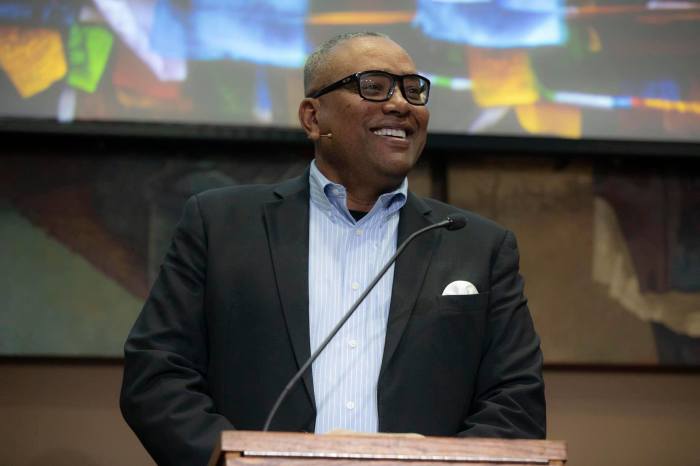6 white seminary presidents meeting to discuss race is bad optics: black SBC leader

The head of the National African American Fellowship of the Southern Baptist Convention says he will soon meet with the leaders of the denomination’s most prominent seminaries to “discuss our concerns” regarding their recent statement denouncing racism but declaring critical race theory incompatible with their beliefs.
Marshal Ausberry said in a statement: “I have been in conversations with SBC leadership and with the leadership of the Council of Seminary Presidents of the SBC. We will be meeting in the near future to further discuss our concerns that affect all ethnic groups in the SBC about the breadth and depth of their recent statement and published comments. As brothers in Christ, we of all people should be able to dialogue and resolve all of our concerns.”
Critical race theory, which has been a lightning rod for debate and division in evangelical circles in recent years, is presented as an ideological framework that some legal scholars argue interrogates the relationship between race, law, and power.
In September, President Donald Trump issued an executive order in which he classified CRT and related concepts like “white privilege” as “offensive and anti-American race and sex stereotyping and scapegoating” after previously directing federal agencies to stop teaching government workers about the concept in diversity training sessions.
At their recent annual session, celebrating the 20th anniversary of the adoption of the revised Baptist Faith & Message, the Council of Seminary Presidents, which is comprised of six seminaries, voted to reject CRT as incompatible with their faith while condemning “racism in any form.”
“In light of current conversations in the Southern Baptist Convention, we stand together on historic Southern Baptist condemnations of racism in any form and we also declare that affirmation of Critical Race Theory, Intersectionality, and any version of Critical Theory is incompatible with the Baptist Faith & Message,” the council said.
Danny Akin of Southeastern Baptist Theological Seminary, Jason K. Allen of Midwestern Baptist Theological Seminary, Jamie Dew of New Orleans Baptist Theological Seminary, Adam W. Greenway of Southwestern Baptist Theological Seminary, Jeff Iorg of Gateway Theological Seminary, and Albert Mohler of Southern Baptist Theological Seminary are all members of the council.
Mohler argued that advocacy based on views like CRT and intersectionality “has no rightful place within an SBC seminary.”
Ausberry, who is also pastor of Antioch Baptist Church in Fairfax Station, Virginia, and first vice president of the SBC, argued that while the statement by the council was well-intended, he and a diverse group of pastors in the SBC were concerned that six white men met to discuss racism without “ethnic representation.”
“Especially for those of us who have experienced the brunt of systemic racism in our daily lives, our seminary presidents are good men and they had good intent,” Ausberry told the Baptist Press. “But the optics of six anglo brothers meeting to discuss racism and other related issues without having ethnic representation in the room in 2020, at worst it looks like paternalism, at best insensitivity. The only outcome can be from their life experience, which really ignores the broader family of Southern Baptists.”
Ausberry also had a more nuanced response to “ideologies from a sociological and anthropological perspective,” such as CRT, noting that “when used appropriately,” they “help us to better understand the inner workings of living in a fallen and sinful world.”
Since its publication on Nov. 30, the statement from the seminary presidents triggered passionate responses from prominent black Christians like Jemar Tisby, president of The Witness, a black Christian collective who is also author of The Color of Compromise: The Truth about the American Church’s Complicity in Racism.
He dismissed the statement as a “commitment to whiteness.”
“The Southern Baptist seminary presidents continue to affirm their commitment to whiteness by quashing any meaningful effort to address racism in their schools or denomination and making those who attempt to do so targets of criticism. Of course, they covered their backs by saying, ‘[w]e stand together on historic Southern Baptist condemnations of racism in any form.’ Still, such statements have all the hallmarks of what Martin Luther King Jr. called ‘pious irrelevancies and sanctimonious trivialities,’” Tisby wrote in a recent op-ed.
Prominent Dallas Pastor Tony Evans also denied affirming it after “members of the 2019 Resolution Committee of the SBC, without my awareness or permission, used my name in their recent Affirmation of Recent Statements from Christian Leaders on Critical Race Theory.”
“I have a great deal of respect for the SBC and the work that they do around the nation and the world, and this misunderstanding does not diminish that in any way,” he explained.
“As I stated in my sermon, which I encourage everyone reading this to watch, I again affirm that the Bible must be the basis for analyzing any and all social, racial or political theories in order to identify what is legitimate or what is not legitimate. But I did not say, nor imply, that CRT or other ideologies lack beneficial aspects—rather that the Bible sits as the basis for determining that. I have long taught that racism, and its ongoing repercussions, are real and should be addressed intentionally, appropriately and based on the authority of God’s inerrant word.”
As the debate over the statement rages on, Ausberry urged Southern Baptists to pray for “a better understanding” and not condemn each other on social media.
“My friends, the world is watching us and I hope and pray that none of us would do anything that degrades our witness and detracts from our focus on the great commission. Our common enemy wants to derail us from reaching the lost,” he said. “I urge all Southern Baptists to refrain from condemning each other on social media and other media outlets. We should pray for each other and pray for a better understanding through our mutual love for Jesus Christ and one another.”




























